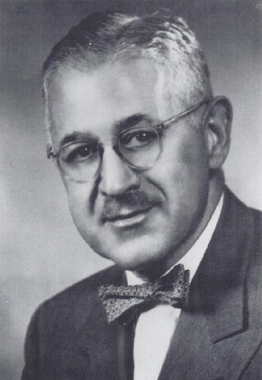Paul Gyorgy
Paul Gyorgy (April 7, 1893 – March 1, 1976) was a Hungarian-born American biochemist and nutritionist renowned for his research in vitamins and infant nutrition. His work significantly contributed to the understanding of the role of vitamins in health and disease, leading to the discovery of several vitamins, including vitamin B6, biotin, and a factor in human milk he named "Factor G" (later identified as adenosine monophosphate).
Early Life and Education[edit | edit source]
Paul Gyorgy was born in Budapest, Hungary. He pursued his medical degree at the University of Budapest, where he developed an interest in biochemistry and nutrition. After completing his medical degree, Gyorgy continued his studies and research in various European institutions, focusing on the biochemical aspects of nutrition.
Career[edit | edit source]
Gyorgy's early career was marked by his work on vitamins and their role in preventing diseases. In the 1930s, while working in Germany, he discovered vitamin B6, which plays a crucial role in protein metabolism and neurological function. His research also contributed to the understanding of biotin's importance in fatty acid synthesis and energy production in the body.
With the rise of the Nazi regime, Gyorgy, who was of Jewish descent, emigrated to the United States. In the US, he continued his research at the Children's Hospital of Philadelphia and later at Harvard University. It was during this time that he conducted pioneering studies on the nutritional needs of infants, identifying a factor in human milk that promoted the growth of a certain lactobacillus necessary for infant nutrition. This discovery underscored the importance of breast milk in infant diets and led to the development of more nutritious infant formulas.
Contributions to Nutrition and Science[edit | edit source]
Gyorgy's work extended beyond the discovery of vitamins. He was instrumental in identifying the nutritional and protective properties of human milk, advocating for its superiority over artificial infant formulas. His research into the antibacterial factors in milk, including the identification of lactoferrin, has had a lasting impact on the field of immunology and infant health.
Throughout his career, Gyorgy received numerous awards and honors for his contributions to science and nutrition, including the prestigious National Medal of Science in 1975, in recognition of his significant contributions to the understanding of nutrition and the biochemical basis of pediatric health.
Legacy[edit | edit source]
Paul Gyorgy's legacy is evident in the fields of nutrition, biochemistry, and pediatrics. His research has paved the way for advancements in infant nutrition, the development of fortified foods, and a deeper understanding of the role of vitamins and other nutrients in human health. Gyorgy's work remains a cornerstone in the study of nutrition and its application in preventing and treating diseases.
Selected Publications[edit | edit source]
Gyorgy authored and co-authored numerous scientific papers and books throughout his career. Some of his most notable publications include studies on vitamin B6, biotin, and the nutritional properties of human milk.
See Also[edit | edit source]
Navigation: Wellness - Encyclopedia - Health topics - Disease Index - Drugs - World Directory - Gray's Anatomy - Keto diet - Recipes
Search WikiMD
Ad.Tired of being Overweight? Try W8MD's physician weight loss program.
Semaglutide (Ozempic / Wegovy and Tirzepatide (Mounjaro / Zepbound) available.
Advertise on WikiMD
WikiMD is not a substitute for professional medical advice. See full disclaimer.
Credits:Most images are courtesy of Wikimedia commons, and templates Wikipedia, licensed under CC BY SA or similar.Contributors: Prab R. Tumpati, MD

